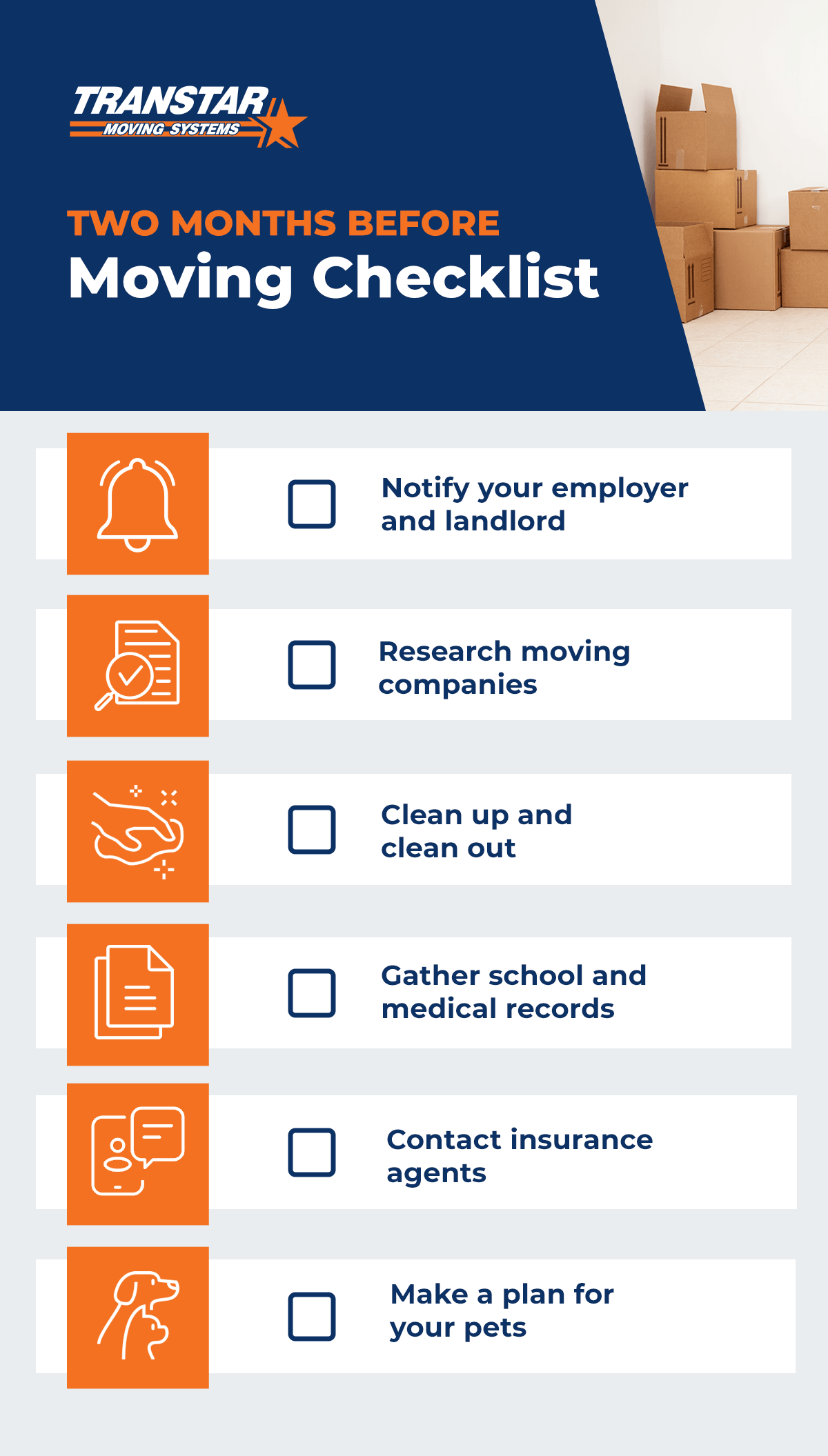Moving is an exciting yet stressful time for everyone involved. Often, we get caught up in the rush and forget important details along the way, which can make the process more difficult than it needs to be. This is why creating a moving timeline checklist can help. Whether you’re moving out of state or just down the street, a moving checklist can help you keep track of everything you need to take care of before you move, ensuring a smoother process.
LEARN ABOUT OUR RESIDENTIAL SERVICES
Our comprehensive moving checklist guide covers everything you need to prepare and do in the months and weeks ahead of your move as well as important steps to take the day of your move. We’ve organized the items of this guide into timeframes ahead of your move during which we recommend taking the corresponding actions. We encourage you to read the full guide, but you can click any of the links below to jump to the corresponding timeframe’s checklist:
Checklist: Two Months Before Moving
Around two months before you move, you need to set the stage for how your preparation is going to go. Follow this two-month moving day checklist to get organized:

1. Create a Moving Binder
Use a binder to keep track of your paper documents, including this list. In your binder, you can include an inventory of all the important items you’re packing, the estimate from your moving company, documents for your children’s new schools and other essential moving records. Keep your binder in a spot where you can’t misplace it.
2. Notify Your Employer of Your Move
If you’re not self-employed or you don’t work remotely, you should let your employer know you’re moving. This way, they can update their records appropriately.
3. Start Researching Moving Companies

Request an on-site estimate from a local moving company in Cherry Hill, NJ. Instead of going with the cheapest or quickest estimate, you should ask questions and shop around for a reliable company. Decide on a realistic budget for your moving services and ask your moving company what the estimate includes.
Be thorough about the company you choose — you’re trusting them with your valuables in transit. They should be reliable, trustworthy and preferably have a good and longstanding reputation in their local community. For further peace of mind, they should confirm whether they have a certificate of insurance against any building damage and are registered with the Department of Transportation.
4. Clean Up and Clean Out
Two months before you move, you should have an idea of what items you’ll bring with you and what you no longer need. Go through your home and decide what to keep, what to donate and what to throw out — create an inventory list to help you keep track of everything. As you pack these items, check them off your list.
5. Gather School and Medical Records
If applicable, visit your children’s school and inform them of your move. Find out what information you need to give to their new school and put it in a binder to ensure you have everything you need.
6. Contact Insurance Agents
Check your homeowner’s insurance policy to find out if moving is covered. Inform your auto insurer and get a quote for your new address. Your rate may go up or down, depending on where you live.
7. Give Your Landlord Notice
If you’re moving out of a rental house or apartment, be sure to inform your landlord that you intend to move at the end of your lease. There may be a specific notice period you’re required to follow in your lease.
8. Research Potential Parking Permits for Moving Day
In some locations, parking permits for moving trucks may be required. Be sure to research whether you’ll need a permit so you can avoid running into issues on moving day.
9. Consider Your Pets
If you’re a pet owner and you’re moving far from your current veterinarian, research your new area for veterinarians and arrange to have your pets’ records transferred.
Checklist: One Month Before Moving Day
A month before you move, you should:
1. Throw a Moving-Away Party
If you’re scheduling a long-distance move, you should spend these last few weeks making time for the friends and family you’re leaving behind. You could throw a goodbye party by inviting your loved ones over for dinner.
2. Use Up Your Perishables
Start using up items you can’t move, such as frozen food, cleaning products and aerosols. Create a list of items that cannot be shipped and use or donate them before you leave.
3. Plan How You’ll Move Valuables
If you use movers, inform them of any objects requiring special attention. You may need to hire a specialty mover to handle high-valuable items, such as pianos, guns and fine art. If you do the packing yourself, label all the fragile boxes so the movers use extra care. Reference your moving-in checklist to make sure you let the movers know of any special instructions you may have.
4. Order Boxes and Moving Supplies
You could collect free boxes from restaurants, grocery stores and office supply stores. If you are using movers, they may provide packing services and supplies at a reasonable cost. Otherwise, be sure to purchase enough boxes and moving supplies to effectively and safely pack your items.
5. Begin Packing Items You Don’t Often Use
About a month out from your move, you can start packing up items you don’t use often. These items might include seasonal clothing and shoes and belongings you have stored in your attic or basement. Be sure to label all boxes, so you can find your belongings easily once you make it to your destination. It is helpful to use a color-coded system — assign a color to each room in your new home and use the corresponding colored markers to label the boxes.
6. Change Your Address
File a change of address with the post office and inform them of your moving date. Contact any companies that send you mail and change the address they have on file for you. Set up a mail forwarding service for the next couple of weeks until you’ve officially moved to your new address.
7. Repair Your House and Vehicle
Before you sell your house or move out of your apartment, deal with any minor repairs on your property. Any damage done to your apartment could make you lose your security deposit. You should also clean out and service your car if you’re moving across the country and you’ll be driving to your new home.
8. Notify All Utility Services of Your Move
Give yourself a little bit of overlap before canceling your electricity, water and internet bill to confirm that you’ll have consistent access to utilities in both your old and new house. Typically, you can give your utility providers an end date, which should be shortly after you move. You should also set up trash removal and recycling services for your new home if needed. Contact health clubs or any other groups and transfer or cancel your memberships.
9. Choose Your Mover and Confirm All Arrangements
Purchase moving insurance and sign all agreements between you and the moving company. Confirm all the details and ask any last-minute questions you have about your move.
10. Measure Your New Home
Take measurements at your new home and confirm that large furniture will fit. Double- and triple-check that you have enough room for your furniture, and make plans to sell or donate anything that won’t fit.
11. Begin Packing in Earnest
Take pictures of your electronics before unplugging them, so you know how to set them up when you relocate. Put all the hardware of your furniture in labeled plastic bags, so you can easily put them back together.
12. Make Travel Arrangements for Your Move
If necessary, arrange travel plans for your pets. Take off from work on move-in day. If possible, schedule your move on a Friday, so you have the weekend to recover and unpack. Additionally, you may want to make arrangements for a babysitter or friend to watch your children while your movers move everything in.
13. Preserve Your Financial and Legal Documents
If you are changing banks, open your new account and remove contents from your safe deposit box. Gather all financial and legal paperwork in one place, keeping birth certificates and passports on your person to protect them.
One Week Before Moving Day
If you are moving in a week, tie up these loose ends:
1. Get Rid of What You Can’t Bring
Dispose of toxic items properly and recycle the items the moving company can’t take.
2. Refill Prescriptions
If you are changing pharmacies, be sure to inform your doctor and have your prescriptions transferred.
3. Return Borrowed Items
Return your borrowed books to the library, and give back any lawn equipment or tools your neighbors lent you.
4. Continue Packing
Aim to have your packing complete a few days before your move. Pack suitcases for everyone in the house, with clothing and toiletries for the last few days.
5. Explore Your New Area
Check out your new neighborhood’s local restaurants and activities if you’re moving close by. Gather contacts of emergency service technicians, doctors and other local providers you’ll need.
6. Confirm All Arrangements
Contact your mover and run through the move-in day plans. You’ll also want to double-check your scheduled child care, pet sitting and utility services.
7. Empty and Defrost Your Fridge
If it is coming with you, make sure your refrigerator is clean and empty. Defrost your freezer at least 24 hours before moving day, and put a towel in front of it to absorb any leaking water. Give away any frozen food that you can’t eat before moving day.
8. Clean Your Current Home
If you’re selling your home, you must clean it to prepare it for the new homeowners. Consider hiring a professional cleaning service to wipe down hard-to-reach areas and disinfect surfaces. Add a special touch by leaving the new homeowners a note or a gift to make them feel welcome.
Moving Day Checklist
On the day of your move, get up early so you can take care of all the items on your house moving checklist:
- Double-check your inventory by referencing the before-moving-in checklist you made.
- Once the house is empty, do a final walk-through to be sure nothing is left behind.
- Tip your movers after they’ve completed their services.
- Make your bed and unpack your toiletries once you make it to your new house.
- Walk around your neighborhood and meet your neighbors.
- Go grocery shopping or order takeout for dinner.
- Thank your real estate agent for helping you find your new house.
Choose Transtar Moving Systems for Your Relocation in Philadelphia and South Jersey

At Transtar Moving Systems, we want to make your moving experience as seamless as possible. With our help and the above checklist in mind, you and your family can experience a smooth moving process.
We offer full-service residential moving to and from South Jersey and Philadelphia, including Princeton, Medford and Cinnaminson, NJ, for your convenience. Contact our team online or call 855-720-7833 to arrange your move.